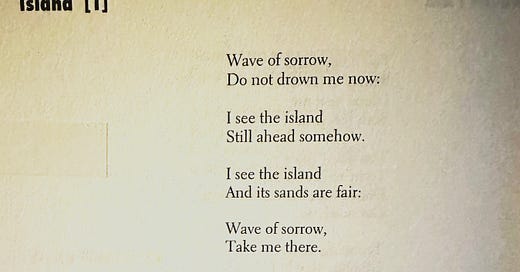

Discover more from Poetry Unbound
A poem to breathe with
"Four breaths, in and out. Four waves, washing up and surging back from a shore."
Dear friends,
Last week, a friend texted me a photo of my favourite Langston Hughes poem, “Island [1]”:
Just a few weeks before that, I’d texted images of that poem to other friends, too. I’d been reading through the brilliant Collected Poems of Langston Hughes over the last few weeks, and highlighting the ones that stood out to me. This one moved me enormously: because of the music of those repeated lines, the sustained imagery, and the raw statement of desire in the poem. That second line, that final line, addressed to the wave of sorrow: “Do not drown me now” and, “Take me there” to the island of the title.
The four small stanzas of this poem are easily memorised, the first and fourth begin with “Wave of sorrow” and the second and third begin with “I see the island”. When you know them well, you can say them in time with your breathing. Four breaths, in and out. Four waves, washing up and surging back from a shore.
It’s got the quality of a lullaby, this short poem; or a hymn, a prayer, a spell, something to say in moments of self-soothing, something that tells the truth of need, alongside the locatedness of that vast ocean. Why is the speaker of the poem in the ocean? Who put them there? Were they abandoned? Or wrecked? Or thrown overboard? The spaciousness of the poem is that the answer can be yes.
The straightforwardness of the request makes its own music. The “somehow” of Langston Hughes’ line “still ahead somehow” makes me think of bewilderment. A destination is being withheld, deliberately, it seems to me. Langston Hughes was once asked what he wrote about, and he said:
Workers, roustabouts, and singers, and job hunters on Lenox Avenue in New York, or Seventh Street in Washington or South State in Chicago — people up today and down tomorrow, working this week and fired the next, beaten and baffled, but determined not to be wholly beaten, buying furniture on the installment plan, filling the house with roomers to help pay the rent, hoping to get a new suit for Easter — and pawning that suit before the Fourth of July.
With such a focus, the poem’s seascape of drowning becomes more than a private sorrow, stretching instead to a systemic one.
His poem reminds me of an old, unattributed prayer from Breton, the Celtic region in the northwest of France: “God help me. The sea is so big and my boat is so small.”
So the question for this week:
What line, or word, or few words, of this famous poem speak to you? I’m curious where it takes you, what you associate with it, how it moves you, and what it moves in you.
Friends, thank you for the comments and conversations in these letters. I’m glad to be with you here.
Pádraig
Poetry in the World
Feed the Beast live reading & chat
If you’re in Manhattan on February 9th, I’d be delighted to see you at 7pm ET at McNally Jackson (4 Fulton Street, NYC 10038). I’ll be in conversation with the brilliant Maya C. Popa and reading from my newest collection of poems, Feed the Beast.
Register here — you can also just turn up!
Subscribe to Poetry Unbound
Open your world with poetry




![Picture of Langston Hughes' poem "Island [1]": "Wave of sorrow,/ Do not drown me now:// I see the island/ Still ahead somehow.// I see the island/ And its sands are fair:// Wave of sorrow,/ Take me there." Picture of Langston Hughes' poem "Island [1]": "Wave of sorrow,/ Do not drown me now:// I see the island/ Still ahead somehow.// I see the island/ And its sands are fair:// Wave of sorrow,/ Take me there."](https://substackcdn.com/image/fetch/w_1456,c_limit,f_auto,q_auto:good,fl_progressive:steep/https%3A%2F%2Fsubstack-post-media.s3.amazonaws.com%2Fpublic%2Fimages%2F26a74f5a-88b5-4535-a4af-632c727c09de_2698x1884.jpeg)











I think the movement from I to Thou, here to there, sorrow to song, wave within me to wave that transcends me- a wave of feeling and being that carries the first wave of sorrow back to another shoreline of being is something I feel and hear and relate to in this poem. Everyday or as often as possible I go down to the beach for what I call my medicine walk. It has become a daily ritual and kind of meditation practice. The other day when I went for my medicine walk I jotted down the following little poem. I am reminded of it as I read the poem and reflection you have shared today. Perhaps in kindred spirit you may enjoy. The poem is simply two lines:
“I left home alone
and returned
accompanied by the universe”
Four breaths in and out - brings to mind a sentence in Ilia Delio's book, Ten Evenings with God: "Prayer, therefore, is God's desire to breathe in me, to be the spirit in my life, to draw me into the fullness of life. When I pray - when I breathe with God - I become part of the intimacy of God's life.”
Rarely do I appreciate the automatic nature of my breath. In fact when I really think about it I am only one breath away from having no breath. In watching my father and wonderful dog, Pepper, take their last breaths it was remarkable how still and peaceful each looked when the breath was no more within them. I remember thinking, especially with my dog, what a challenge it was to continue breathing and how, when he stopped, I knew he was at peace.
Thank you for reminding me how important my breath is and this leads to appreciation for my body as well!